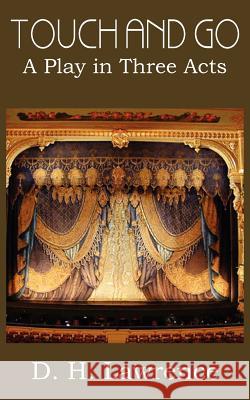Touch and Go, a Play in Three Acts » książka
Touch and Go, a Play in Three Acts
ISBN-13: 9781612039435 / Angielski / Miękka / 2012 / 108 str.
Set in the Midlands, Lawrence's Touch and Go is a three-act play dealing with clash between capitalism and labor. In his attempt to organize miners Willie Houghton argues that capitalism is like a wheel-cart and labor is like the frog crushed beneath its wheels. "The essence of tragedy, which is creative crisis, is that a man should go through with his fate, and not dodge it and go bumping into an accident. And the whole business of life, at the great critical periods of mankind, is that men should accept and be one with their tragedy. Therefore we should open our hearts. For one thing we should have a People's Theatre. Perhaps it would help us in this hour of confusion better than anything." D. H. Lawrence was an English novelist, poet, playwright, essayist, literary critic and painter whose works represent a reflection upon the dehumanizing effects of modernity and industrialization. In his writings Lawrence confronts issues relating to emotional health and vitality, spontaneity, and instinct often apposing current social acceptance. E. M. Forster, in an obituary notice, described him as "the greatest imaginative novelist of our generation."
Set in the Midlands, Lawrences Touch and Go is a three-act play dealing with clash between capitalism and labor. In his attempt to organize miners Willie Houghton argues that capitalism is like a wheel-cart and labor is like the frog crushed beneath its wheels."The essence of tragedy, which is creative crisis, is that a man should go through with his fate, and not dodge it and go bumping into an accident. And the whole business of life, at the great critical periods of mankind, is that men should accept and be one with their tragedy. Therefore we should open our hearts. For one thing we should have a Peoples Theatre. Perhaps it would help us in this hour of confusion better than anything."D. H. Lawrence was an English novelist, poet, playwright, essayist, literary critic and painter whose works represent a reflection upon the dehumanizing effects of modernity and industrialization. In his writings Lawrence confronts issues relating to emotional health and vitality, spontaneity, and instinct often apposing current social acceptance. E. M. Forster, in an obituary notice, described him as "the greatest imaginative novelist of our generation."











